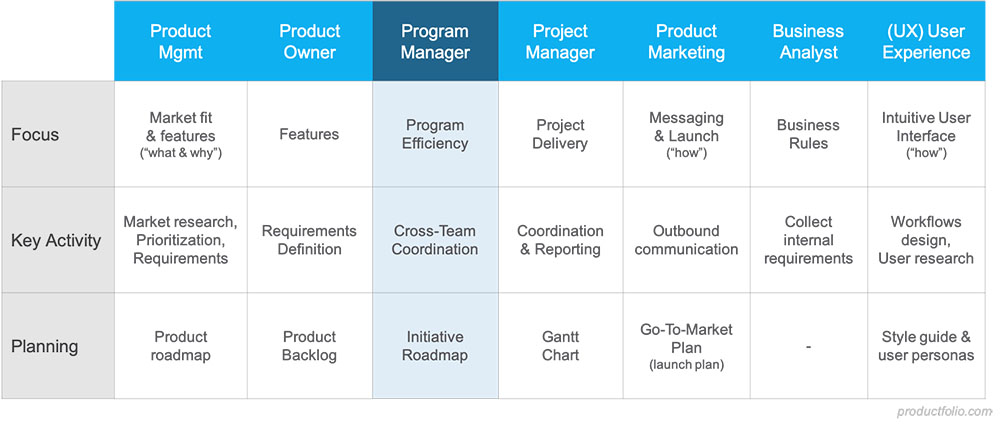Who is a Product Manager?
Product managers are tasked with the role of strategically driving the development of products until they get into the market as well as ensuring products are constantly improved to effectively meet market needs. The role of a product manager entails determining the needs of customers, assessing market competition and documenting high-level requirements. In addition, they review new product ideas and share key insights regarding the product development process with key stakeholders such as development teams and customers.
Product managers also analyze a product’s performance on the market, prioritize features and ensure products which are designed meet the needs of customers. PMs are responsible for overseeing the intersection of business, technology and design which means a broader level handling things at the expense of detailed product specifications.

Who is a Program Manager?
A Program Manager’s role is internally focused as it assumes someone else is defining the strategy. As opposed to a Product Manager whose role is strategic, Program Managers duties are very operationally oriented. They identify and coordinate relationships among products, projects as well as other initiatives that exist within an organization. A program is a group of associated projects that work collectively to accomplish a business strategy. Program Managers also coordinate Scrum teams ensuring their duties abide by best practices and abide by efficient delivery pipelines. They also coordinate new product launches, implement new sales processes and expansion to new locations.
Program Management involves working closely with all the relevant departments such as technical, marketing, customer support in order to coordinate cross-functional efforts and ensure everything is on track as envisioned. A program manager’s role is largely technical as they go deeper into more detail compared to product managers. For this reason, they’re regarded as technical product managers as they engage deeply with technical and engineering teams dealing with issues such as handling error events. A program manager also directs a team of project managers and their success is measured if they’re able to deliver a reliable and usable software.
Program managers are also tasked with the responsibility of identifying highly talented and skilled people who can deliver exemplary results. In addition, a program manager has to define management controls including procedures, processes and reporting that will be required to smoothly manage the program. Another key role associated with program managers is budgeting as PMs are tasked with formulating overall budgets and closely collaborating with executives to agree on a target budget and distribute resources to individual projects as needed.
Program managers take on leadership roles as they’re tasked with the overall completion of all programs within their companies. This requires them to gain a lot of trust and respect from their members as well as learn how to effectively motivate everyone.
A Key Distinction
Product managers focus more on the “why” aspect which involves examining questions such as, why build a product this way?, Why prioritize this feature over another? Why target this customer segment? And, why set product prices at this level? On the other hand, program management is an organization-wide role which means program managers will worry about the “How?” and “When?” questions. Issues of concern here entail how to allocate enough time and personnel to handle key parts of the project such as customer support to product training teams and how much should be allocated to various initiatives. Additionally, program managers have to know when the appropriate time comes for the marketing team to begin their endeavors.
When properly managed and utilized, product managers and program managers can work together seamlessly and offer strategic advantages to their companies. Smart companies do not choose one but rather, find a way of incorporating both roles within the organization in order to leverage the benefits.